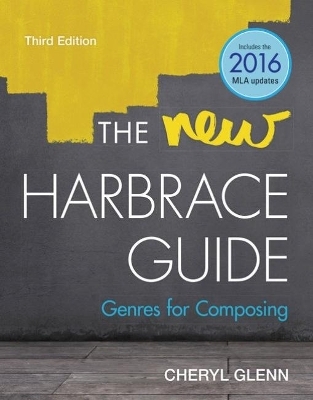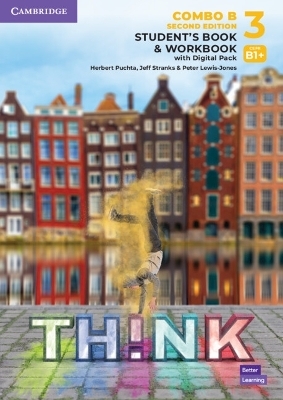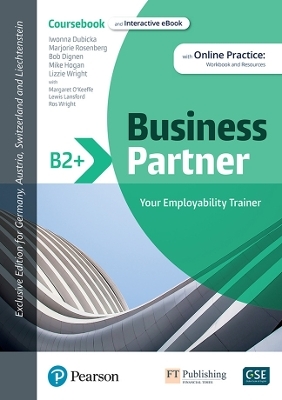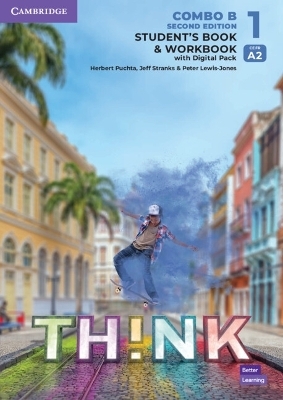
The New Harbrace Guide
Wadsworth Publishing Co Inc
978-0-357-60053-5 (ISBN)
- Titel z.Zt. nicht lieferbar
- Versandkostenfrei innerhalb Deutschlands
- Auch auf Rechnung
- Verfügbarkeit in der Filiale vor Ort prüfen
- Artikel merken
Dr. Cheryl Glenn, Distinguished Professor of English at Penn State University, is an international leader in the field of rhetoric and writing. She has served as chair of the Conference on College Composition and Communication (CCCC) and has been named Rhetorician of the Year and the 2019 CCCC Exemplar. She has received numerous awards for her works on SILENCE AND LISTENING AS RHETORICAL ARTS and, most recently, RHETORICAL FEMINISM AND THIS THING CALLED HOPE. Across the arc of her career, she remains most proud of her teaching awards. Today, Dr. Glenn continues to speak and write extensively about the importance of everyone having a voice, of being listened to and, of course, of the power of the written word.
Preface
PART I: ENTERING THE CONVERSATION: THE RHETORICAL SITUATION.
1. Understanding the Rhetorical Situation.
Rhetoric Surrounds Us. Finding an Opportunity for Change. The Decision to Engage. The Force Awakens". Analyzing the Elements of the Rhetorical Situation. Thinking Rhetorically About Purpose and Audience. Thinking Rhetorically About Genre and Media. Assignment: Rhetorical Opportunities. Michael Bérubé, "Life as We Know It".
2. Responding to the Rhetorical Situation.
Thinking Rhetorically About Persuasion. A Problem-Solving Approach. Making Claims. Using the Available Means of Persuasion. Malala Yousafzai, Blog Entries [I Am Afraid], [Interrupted Sleep]. Sojourner Truth, "Ain't I a Woman". The Amethyst Initiative, "It's Time to Rethink the Drinking Age". Resources and Constraints. Assignment: A Rhetorical Analysis.
3. The Writer as Reader.
Reading Strategies. Barry M. Prizant, "Uniquely Human: A Different Way of Seeing Autism [Animated Movies and Summary]". Summary. Critical Response. Analysis and Synthesis.
Jordynn Jack, Autism and Gender: From Refrigerator Mothers to Computer Geeks ["Savants" and "Geniuses"]. Assignment: The Synthesis (or Research) Essay.
4. Rhetorical Success in a Digital World.
Thinking Rhetorically About Multimedia Texts. Callout Card for Family Violence Prevention. Designing Multimedia Texts to Persuade. Pink Ribbon Website (annotated). Santa Fe Travel Website. How Images Tell a Story. Infographics. War Resisters League, "Where Your Income Tax Money Really Goes" (infographic). Considering Audience, Purpose, and Accessibility in Multimedia Compositions. NOAA, "Protecting Our Planet Begins with You". The Brazos Gumbo Facebook Page. ViziGoGo Webpage. Caladenia Addams, YouTube: Bad Questions to Ask a Transsexual. Grace Randolph, YouTube: Concussion Movie Review. Carmine Gallo, Five Basic Elements in Every Steve Jobs Presentation. Assignment: Analyzing Images. Nike "Test Your Faith Daily" (advertisement).
PART II: WRITING PROJECTS: RHETORICAL SITUATIONS FOR COMPOSING.
5. Memoirs.
Genre in Focus: The Food Memoir. Reading Rhetorically. Key Features of a Memoir. Anna Seitz, "Herb's Chicken" (annotated). Using Synthesis and Analysis. Responding to the Rhetorical Situation. Understanding the Rhetorical Situation. Writing a Persuasive Memoir: A Guide. Advantages and Limitations of a Memoir. Revision and Peer Review. Additional Assignments: Knowledge Transfer. Grammar in Context: Thinking Rhetorically about Verb Tense.
6. Profiles.
Genre in Focus: The Bio. Reading Rhetorically. Key Features of a Profile. Sandra Sobieraj Westfall et al., "Heroes on the Train: 'It Was Either Do Something or Die'" (annotated). Using Synthesis and Analysis. Responding to the Rhetorical Situation. Understanding the Rhetorical Situation. Writing a Persuasive Profile: A Guide. Advantages and Limitations of a Profile. Revision and Peer Review. Additional Assignments: Knowledge Transfer. Grammar in Context: Thinking Rhetorically about Inclusive Language.
7. Investigative Reports.
Genre in Focus: The Explainer Report. Reading Rhetorically. Key Features of an Investigative Report. Christina Rosen, "The Myth of Multitasking" (annotated). Using Synthesis and Analysis.
Responding to the Rhetorical Situation. Understanding the Rhetorical Situation. Writing a Persuasive Investigative Report: A Guide. Advantages and Limitations of an Investigative Report. Revision and Peer Review. Additional Assignments: Knowledge Transfer. Grammar in Context: Thinking Rhetorically about Attributive Tags.
8. Position Arguments.
Genre in Focus: The Commentary.
Reading Rhetorically.
Key Features of a Position Argument.
Alicia Williams, "The Ethos of American Sign Language" (annotated).
Using Synthesis and Analysis.
Responding to the Rhetorical Situation. Understanding the Rhetorical Situation.
Writing a Persuasive Position Argument: A Guide.
Advantages and Limitations of a Position Argument.
Revision and Peer Review.
Additional Assignments: Knowledge Transfer.
Grammar in Context: Thinking Rhetorically about Coherence—Word Choice, Repetition, and Sentence Structure.
9. Proposals.
Genre in Focus: The Public Service Announcement. Reading Rhetorically. Key Features of a Proposal. Simon Arias, "Raise Pennsylvania's Minimum Wage" (annotated). Using Synthesis and Analysis. Responding to the Rhetorical Situation. Understanding the Rhetorical Situation.
Writing a Persuasive Proposal: A Guide. Advantages and Limitations of a Position Argument.
Revision and Peer Review. Additional Assignments: Knowledge Transfer. Grammar in Context: Thinking Rhetorically about Linking Ideas.
10. Evaluations.
Genre in Focus: The Film Review. Reading Rhetorically. Key Features of an Evaluation. Alexis Walker, "Donuts at Easton's Center Circle: Slam Dunk or Cycle of Deterioration?" (annotated).
Using Synthesis and Analysis. Responding to the Rhetorical Situation. Understanding the Rhetorical Situation. Writing a Persuasive Evaluation: A Guide. Advantages and Limitations of an Evaluation. Revision and Peer Review. Additional Assignments: Knowledge Transfer. Grammar in Context: Thinking Rhetorically about Adjectives and Adverbs.
11. Critical Analyses.
Genre in Focus: Culural Analysis. Reading Rhetorically. Key Features of a Critical Analysis. Anna Seitz, "The Real-Time Consequences of an Online Degree" (annotated). Using Synthesis and Analysis. Responding to the Rhetorical Situation. Understanding the Rhetorical Situation.
Writing a Persuasive Critical Analysis: A Guide. Advantages and Limitations of a Critical Analysis. Revision and Peer Review. Additional Assignments: Knowledge Transfer. Grammar in Context: Thinking Rhetorically about Precise Language.
12. Literary Analyses.
Genre in Focus: Slam Poetry. Reading Rhetorically. Key Features of a Literary Analysis.
Marianne Moore, "Poetry". Ralph Rees, "The Reality of Imagination in the Poetry of Marianne Moore" (annotated). Using Synthesis and Analysis. Responding to the Rhetorical Situation.
Understanding the Rhetorical Situation. Writing a Persuasive Literary Analysis: A Guide. Advantages & Limitations of a Literary Analysis. Revision and Peer Review. Additional Assignments: Knowledge Transfer. Grammar in Context: Thinking Rhetorically about Ellipsis Points in Quotations.
PART III: PROCESSES AND STRATEGIES FOR COMPOSING.
13. From Tentative Idea to Finished Project.
Planning a Response. Drafting a Response. Revising a Response. Peer Evaluation. Editing and Proofreading a Response. Designing the Final Draft. Anastasia Simkanin, "Technology and the Learning Process: One Student's View".
14. Rhetorical Methods of Development.
Narration. Description. Exemplification. Definition. Classification and Division. Comparison and Contrast. Cause-and-Effect Analysis. Process Analysis. Argument.
PART IV: A GUIDE TO RESEARCH.
15. Thinking Rhetorically about Research.
Richard A. Lovitt, "Clues to Compulsive Collecting". Considering the Rhetorical Situation.
Identifying the Research Question. Locating an Audience. Establishing your Purpose. Using a Research Log.
16. Identifying Sources.
Jeremy Berlin, "Pop Cultures". Sources for Research. Fieldwork. Gillian Petrie, Interview of Jan Frese. Preparing a Working Bibliography.
Chapter 17 Evaluating Sources.
Responding to Your Sources. Questioning Sources. Preparing an Annotated Bibliography.
18. Synthesizing Sources: Summary, Paraphrase, and Quotation.
Avoiding Plagiarism. Summarizing Sources. William Lutz, "Doubts about Doublespeak".
Sample Student Summary: Jacob Thomas, "Summary of 'Doubts about Doublespeak'".
Paraphrasing Sources. Quoting Sources.
19. Acknowledging Sources in MLA Style.
MLA Guidelines for In-Text Citations. MLA Guidelines for Documenting Works Cited.
Sample MLA Research Paper: Greg Coles, "Slang Rebels".
20. Acknowledging Sources in APA Style.
APA Guidelines for In-Text Citations. APA Guidelines for Documenting References. Sample APA Research Paper: Catherine L. Davis, "Perceptions of Peers' Drinking Behavior".
PART V: REAL SITUATIONS FOR REAL WRITING: A THEMATIC READER.
21. Food and the (Cultural) Experience of Taste.
Margaret Mead, "The Changing Significance of Food [Overnourished and Undernourished in America]".
Michael Pollan, "Out of the Kitchen, Onto the Couch [The Collapse of Home Cooking]".
Karen Hernandez, "Why We Should Ditch the Slow Food Movement [A Response to Michael Pollan]".
Corby Kummer, "Good-bye, Cryovac [Local Food, College Food Service, and Scraping Your Own Plate]".
Alberto Mingardi, "Embrace the Food Tech That Makes Us Healthier—'Locavores' and Other Sustainability Advocates Oppose the Innovations That Extend and Improve Life". Community Connections.
22. The Millennial Generation.
Joel Stein, "Millennials: The Me, Me, Me Generation". Joel Landau, "VIDEO: Filmmaker Apologizes on Behalf of Entire Millennial Generation: 'We Suck and We're Sorry'". Pew Research Center, "Most Millennials Resist the 'Millennial' Label". David Fallarme, "A Look at How Gen Y Communicates". Tom McBride, Ron Nief, and Charles Westerberg, "Beloit Mindset List 2019". Community Connections.
23. Taking Up (Public) Space.
Pierre Christin and Olivier Balez, "Robert Moses: The Master Builder of New York City [The Battle with Jane Jacobs]" (graphic novel). Anthony Flint, Who Really Owns Public Spaces?. Abby Phillip, "Oklahoma Ten Commandments Statue Must Be Removed, State Supreme Court Says". Emily Badger, "How Smart Phones Are Turning Our Public Places into Private Ones". Jamie Utt, "From ManSpreading to ManSplaining—Six Ways Men Dominate the Space around Them". Community Connections.
24. Whose Lives Matter?.
Todd S. Purdum, "Whose Lives Matter?". Roxane Gay, "A Tale of Two Profiles".
Malcolm-Aime Musoni, "Being an 18-Year-Old Black Man a Year after Mike Brown".
Carimah Townes, "Obama Explains the Problem with 'All Lives Matter'".
William J. Wilson, "The Other Side of Black Lives Matter". Community Connections.
25. STEM vs. STEAM.
Melissa Davey, "Neil deGrasse Tyson Calls Scientific Illiteracy a Tragedy of Our Times".
Terence Monmaney, "How Much Do Americans Know About Science?". Anne Jolly, "STEM vs. STEAM: Do the Arts Belong?". Nora Caplan-Bricker, "New Evidence: There is No Science-Education Crisis". Marguerite Del Giudice, "Why It's Crucial to Get More Women into Science".
Community Connections.
PART VI: A RHETORICAL GUIDE TO GRAMMAR AND SENTENCE STYLE [ONLINE].
Appendix 1: Essay Exams and the Rhetorical Situation [Online].
Appendix 2: Oral Presentations and the Rhetorical Situation [Online].
Appendix 3: Portfolios and the Rhetorical Situation [Online]."
| Erscheint lt. Verlag | 7.1.2020 |
|---|---|
| Verlagsort | Belmont, CA |
| Sprache | englisch |
| Gewicht | 680 g |
| Themenwelt | Sonstiges ► Geschenkbücher |
| Geisteswissenschaften ► Sprach- / Literaturwissenschaft ► Sprachwissenschaft | |
| ISBN-10 | 0-357-60053-3 / 0357600533 |
| ISBN-13 | 978-0-357-60053-5 / 9780357600535 |
| Zustand | Neuware |
| Haben Sie eine Frage zum Produkt? |
aus dem Bereich


